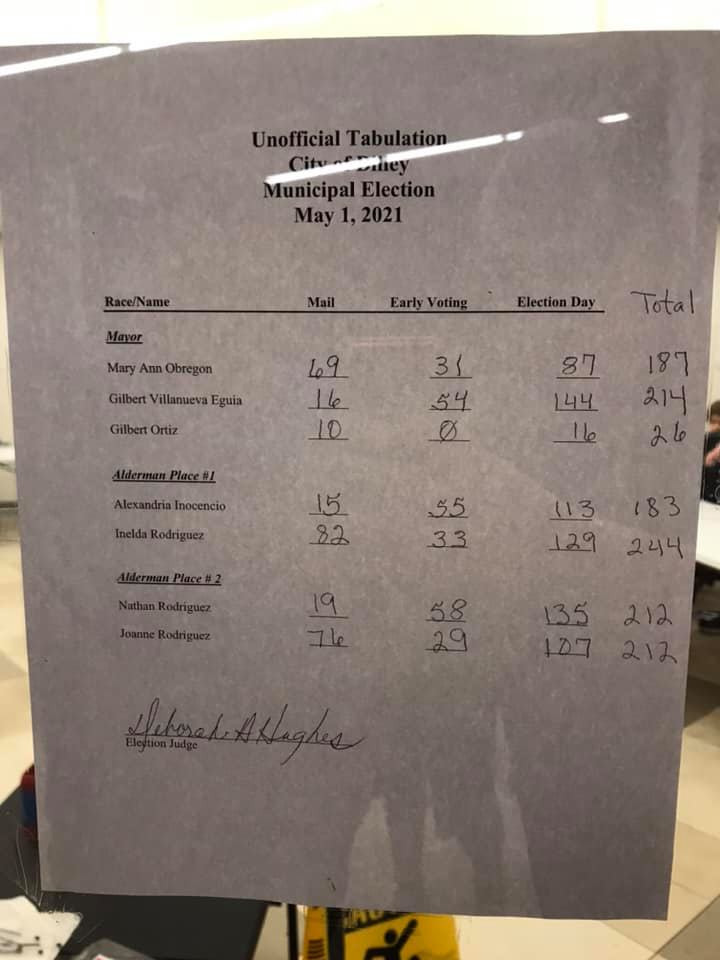
According to the unofficial Dilley election results, which will become official when canvassed, Dilley voters selected Gilbert Villanueva Eguia as Mayor, Inelda Rodriguez as Councilperson Place 1, and a tie vote left Councilperson Place 2 undetermined.
Gilbert Villanueva Eguia unseated Mayor Obregon, who dominated elections in Dilley for decades. Obregon held the mayor position continuously since 2009, and had served as Dilley mayor as far back as the 90s.
Inelda Rodriguez will be serving as Dilley Councilperson after winning an election on her first attempt. At 244 votes, Rodriguez had the highest number of votes in the 2021 Dilley election.
Councilperson Joanne Rodriguez and Nathan Rodriguez campaigned to a draw at 212 votes apiece.
WHAT HAPPENS NEXT?
The city of Dilley will likely confer with the Texas Secretary of State to ensure accuracy before releasing details to the public.
The Election Code for General Law Type-A cities such as Dilley states that “a person must receive more votes than any other person for the office.” Since neither candidate received more votes than the other in Council Place 2, we know this is unresolved.
Here are some of the possibilities of what happens next:
–Provisional Ballots affect the canvass
Some people cast provisional ballots if they don’t have proper ID, questions about residency or legal name, or other issues. The voter is allowed to cast the provisional ballot, then “cure” it within a specified time frame by producing the required documents. The qualified, eligible votes would be added to the certified tally, and could affect the outcome. The number of provisional ballots, if any, were not posted with the unofficial results.
–A recount
Given how long it took for the unofficial results to be released on the night of the election, it’s likely the ballots were counted a few times before posting. If the tie stands after the canvass, the city could order a recount with the cooperation of the candidates. Also, a recount might allow the candidates and two appointees to supervise the tally.
–If the results stand after a recount, a runoff
After the recount and canvass certifying the canvass results, the city might order a runoff election that would have only Councilperson Joanne Rodriguez and Nathan Rodriguez on the ballot. A runoff would take place 20-30 days after the recount.
–Other Possibilities…
CASTING OF LOTS
I can’t find if the following provision applies to General Law Type-A cities, but in at least one part of the Texas Election Code, the tying candidates are allowed to “cast lots” if the recount does not resolve the election.
From KERA North Texas News: You may be wondering what it means to “cast lots.” According to Wikipedia, it’s a form of cleromancy. You may now be wondering what cleromancy is. It’s a form of selection where the outcome is determined in a random manner, such as by rolling dice or like we saw in Virginia, pulling a name out of a bowl. And using the phrase “casting of lots” instead of “random drawing” or “drawing names” harkens back to biblical times. There are several references to casting lots in the Bible. It was even how Roman soldiers decided who won Jesus’ clothes when they crucified him. Modern definitions point to casting lots as being a way to reveal the will of God, or other supernatural entities.
Why would a candidate agree to this? Campaigning can be extremely difficult, personally expensive, and emotionally taxing. They just might want to get the process over with. Also, elections cost the government entities time and money.
-WITHDRAWAL
There are any number of reasons a candidate may get this far only to decide that they don’t want the position anymore, and a candidate’s withdrawal is another way the election could be resolved.
